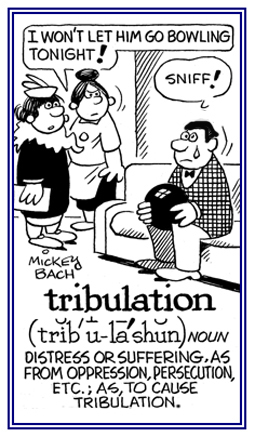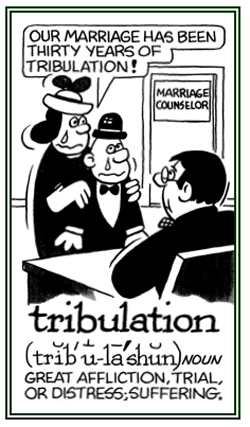-ation, -ization (-iz[e] + -ation); -isation (British spelling variation)
(Greek > Latin: a suffix; action, act, process, state, or condition; or result of doing something)
Although there are over 1,450 word entries ending with -ation or -ization listed in this unit, there are certainly many more which exist in the English language. At any rate, this unit provides a significant number of -ation and -ization examples for you to see.
2. The conversion of one matter into another: Alchemists In the Middle Ages tackled the transubstantiation of turning lead into gold, but it never worked out and has never worked to this day!
2. A state of terror, alarm, fright, or an excessive disturbance: Even though Mary had a psychiatrist working with her to overcome a dread of flying, she still had a great deal of difficulty getting on a passenger plane without a significant degree of trepidation.
In the biology class at Jane's high school, several students refused to touch a harmless snake because of their trepidation of even being near the animal.


Go to this Word A Day Revisited Index
so you can see more of Mickey Bach's cartoons.
2. An experience that tests one's endurance, patience, or religious faith: The illness of Donna's son has been a cause of great tribulation for her and her husband.
3. Etymology: from Old French tribulacion (12th century), from Late Latin tribulationem, tribulatio, "distress, trouble, affliction"; from tribulatus, tribulare, "to oppress, afflict"; a figurative use by Christian writers of Latin tribulare "to press"; also possibly, "to thresh out grain;" from tribulum "threshing sledge", from stem of terere, "to rub" + -bulum, a suffix forming names of tools.
Originally tribulation came from Greek; then through Latin, "to press; affliction"; and by extension, "distress, great trial", or "affliction".
The Roman tribulum was a sledge consisting of a wooden block studded with sharp pieces of flint or iron teeth. It was used to bring force and pressure against wheat in grinding out grain.
The machine suggested the way trouble grinds people down and oppresses them, tribulations becoming another word for troubles and afflictions. The word is first recorded in English in 1330.
The Romans ground out their corn (grain) with a heavy roller, mentioned in Vergil’s Georgics among agricultural instruments: the tribulum, a diminutive noun, from tritere, trit-, "to rub", from Greek tribein, "to rub".
"Being ground under and pressed out" made an excellent metaphor to express the trials and tribulations of the early Christians.


Go to this Word A Day Revisited Index
so you can see more of Mickey Bach's cartoons.
2. A condition of having been ground or rubbed into a fine powder: The chef used a stone mortar and pestle to create a trituration of fine herbs for the new recipe.
3. A pharmacologic medicinal mixture of powdered drugs prepared pharmaceutically: The druggist, Mr. Johnson, prepared a trituration which she instructed the patient to apply to the wound on her leg three times every day.
4. The mixing of an amalgam, usually of silver and mercury, for use in filling cavities in teeth: Dr. Jackson, the dentist, promised the trituration which she had compounded would not hurt the enamel on the adjacent teeth.
2. In banking, a system of electronic check recording under which canceled checks are not returned to customers by the bank.
3. Something that has been shortened, lopped, or cut off.
4. Anything that has a square end as if it were cut off; lacking an apex or point.


